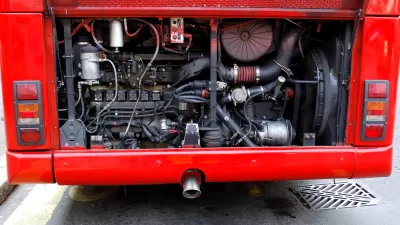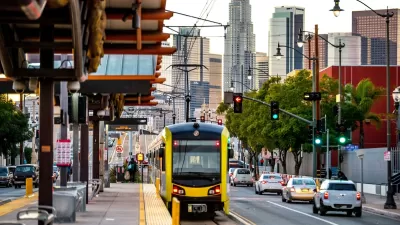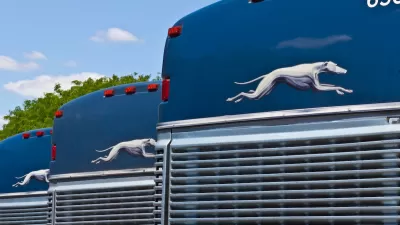In a recent blog post (at http://www.planetizen.com/node/44518) Steven Polzin argues that drivers are more productive because they get places faster. His post, in turn, generated an avalanche of critiques noting the negative externalities of auto travel (e.g. pollution, death and injury from traffic accidents, health costs of obesity, etc.). But what I'd like to address is something else: the positive productivity benefits of transit use. Let's suppose that it takes me 30 minutes to reach destination X on the bus, and 15 minutes by car. Obviously, the car is more productive. Right?
In a recent blog post (at http://www.planetizen.com/node/44518) Steven Polzin argues that drivers are more productive because they get places faster. His post, in turn, generated an avalanche of critiques noting the negative externalities of auto travel (e.g. pollution, death and injury from traffic accidents, health costs of obesity, etc.).
But what I'd like to address is something else: the positive productivity benefits of transit use. Let's suppose that it takes me 30 minutes to reach destination X on the bus, and 15 minutes by car. Obviously, the car is more productive. Right?
Not necessarily. On the bus, I can read and write. In my job, reading and writing are fairly major parts of my work, so being able to read is really, really important.*
In addition, I can safely make cell phone calls and text messages on the bus; such activity, although common for drivers, is nevertheless unwise. If you are tempted to use a car as a phone booth or restaurant, please google "distracted driving"; you will learn that such behavior is controversial to say the least.
And if I have to walk to a transit stop, this is actually productive time as well, insofar as it brings exercise into my day.
Admittedly, not all transit trips are equally productive: on an overcrowded transit vehicle, I may have to stand, thus making it more difficult for me to engage in any of the rewarding activities discussed above. In my experience, there has been a tradeoff between the overall quality of the transit system and the ability to get a seat of my own. In cities with mediocre transit systems, I spend more time waiting for buses and getting to my destination (bad) but have no difficulty getting a seat (good); an inadequate transit system, by scaring off customers, may actually make transit service more physically comfortable in this respect. In downtown Toronto or midtown Manhattan, travel time is more likely to be competitive with driving (good) but I might have to stand up (bad).
*Granted, you can listen to "books on tape" in a car, but audiobooks are not an adequate substitute for real books for two reasons. First, only the most popular books are on tape; for example, a brief look at amazon.com reviewed no audiobook versions of anything by Andres Duany, Sam Staley or Jane Jacobs- to name three of the more popular writers on planning issues. Second, the
necessity of paying attention to other drivers limits my ability to get very
much out of the book.

Alabama: Trump Terminates Settlements for Black Communities Harmed By Raw Sewage
Trump deemed the landmark civil rights agreement “illegal DEI and environmental justice policy.”

Study: Maui’s Plan to Convert Vacation Rentals to Long-Term Housing Could Cause Nearly $1 Billion Economic Loss
The plan would reduce visitor accommodation by 25% resulting in 1,900 jobs lost.

Planetizen Federal Action Tracker
A weekly monitor of how Trump’s orders and actions are impacting planners and planning in America.

Waymo Gets Permission to Map SF’s Market Street
If allowed to operate on the traffic-restricted street, Waymo’s autonomous taxis would have a leg up over ride-hailing competitors — and counter the city’s efforts to grow bike and pedestrian on the thoroughfare.

Parklet Symposium Highlights the Success of Shared Spaces
Parklets got a boost during the Covid-19 pandemic, when the concept was translated to outdoor dining programs that offered restaurants a lifeline during the shutdown.

Federal Homelessness Agency Places Entire Staff on Leave
The U.S. Interagency Council on Homelessness is the only federal agency dedicated to preventing and ending homelessness.
Urban Design for Planners 1: Software Tools
This six-course series explores essential urban design concepts using open source software and equips planners with the tools they need to participate fully in the urban design process.
Planning for Universal Design
Learn the tools for implementing Universal Design in planning regulations.
Caltrans
Smith Gee Studio
Institute for Housing and Urban Development Studies (IHS)
City of Grandview
Harvard GSD Executive Education
Toledo-Lucas County Plan Commissions
Salt Lake City
NYU Wagner Graduate School of Public Service






























